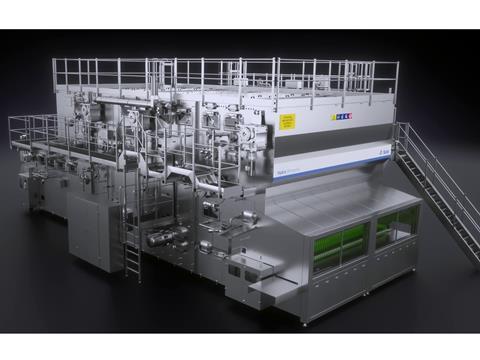
Sidel has launched its new bottle washer with combined chemical and ultrasound technology, aiming to reduce water and steam consumption and CO2 emissions.
The company says growing focus on the environmental impact of packaging, combined with reuse targets set by legislation, is driving increased demand for returnable glass and PET bottle solutions, seeking to significantly reduce the need for primary raw materials while ensuring products are delivered safely to consumers.
Sidel’s new bottle washer is said to reduce washing time and the temperature required while improving the machine’s performance. Apparently, the Hydra Ultrasonic achieves high washing efficiency on interior and exterior walls, removing some caustic resistant types of dirt and cleaning carrier beams through ultrasound technology, resulting in lower rejection rates and increasing production by up to 15% (with 75°C washing).
Sidel says the solution removes dirt and debris with greater efficiency at a lower temperature throughout the bottle washing process, resulting in a 20% reduction in steam consumption and a 15% reduction in water consumption. It also enables 100% electrification through the heat pump, replacing steam with hot water and cutting CO2 emissions.
Aiming to help beverage bottlers reduce their production costs through total cost of ownership (TCO) savings, Sidel states that the solution requires shorter washing time and fewer components such as motors, pockets and chain length, and reduces plant heating by up to 50%. Due to this, the Hydra Ultrasonic reportedly achieves a 20% reduction in overall footprint compared to traditional bottle washing solutions.
The Hydra Ultrasonic is due to be revealed at BrauBeviale in Nuremberg, Germany from 26 –28 November 2024, at Sidel’s stand in Hall 7A, Booth 223.
Sidel recently partnered with Twellium Industrial Company to develop a new PET packaging facility in Kumasi, Ghana for still and carbonated beverages, said to feature ‘Africa’s fastest’ complete PET water line. The line is said to have a production output of 80,000 bottles per hour, using Sidel’s Combi solution which combines blow moulding, filling, and capping into a single, compact, and integrated solution.
In related news, this month KHS explained how its canning line technology has been utilized for drinks brand Mattoni 1873’s mineral water. Using the line, recyclable beverage cans made of around 70% recycled aluminium are being filled with mineral water ‘for the very first time’ in the Czech Republic.
If you liked this story, you might also enjoy:
The ultimate guide to the Packaging and Packaging Waste Regulation in 2024
How are the top brands progressing on packaging sustainability?
Sustainable Innovation Report 2024: Current trends and future priorities
Everything you need to know about global plastic sustainability regulation














No comments yet